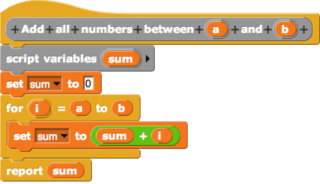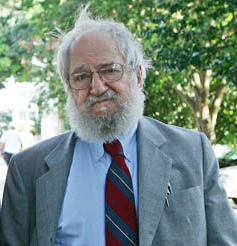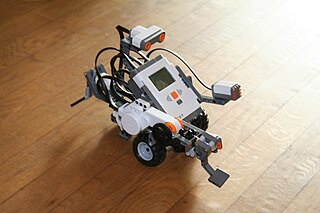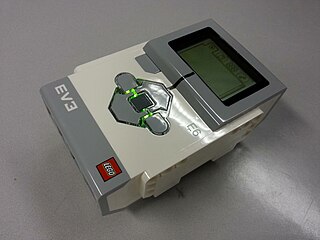
Lego Mindstorms is a discontinued line of educational kits for building programmable robots based on Lego bricks. It was introduced on 1 September 1998 and was discontinued on 31 December 2022.

In computing, a visual programming language, also known as diagrammatic programming, graphical programming or block coding, is a programming language that lets users create programs by manipulating program elements graphically rather than by specifying them textually. A VPL allows programming with visual expressions, spatial arrangements of text and graphic symbols, used either as elements of syntax or secondary notation. For example, many VPLs are based on the idea of "boxes and arrows", where boxes or other screen objects are treated as entities, connected by arrows, lines or arcs which represent relations. VPLs are generally the basis of Low-code development platforms.

Laboratory Virtual Instrument Engineering Workbench (LabVIEW) is a graphical system design and developmentplatform produced and distributed by National Instruments, based on a programming environment that uses a visual programming language. It is widely used for data acquisition, instrument control, and industrial automation. It provides tools for designing and deploying complex test and measurement systems.
leJOS is a firmware replacement for Lego Mindstorms programmable bricks. Different variants of the software support the original Robotics Invention System, the NXT, and the EV3. It includes a Java virtual machine, which allows Lego Mindstorms robots to be programmed in the Java programming language. It also includes 'iCommand.jar' which allows you to communicate via bluetooth with the original firmware of the Mindstorm. It is often used for teaching Java to first-year computer science students. The leJOS-based robot Jitter flew around on the International Space Station in December 2001.

The FIRST LEGO League Challenge is an international competition organized by FIRST for elementary and middle school students.
BrickOS is an open-source operating system created by Markus Noga as firmware to operate as an alternative software environment for the Lego Mindstorms Robotic Invention System. BrickOS is the first open-source software made for Lego Mindstorms robots. It allows development using the C, C++, and Java programming languages. Programs are cross compiled using the g++ and Jack compilers, with the toolchain targeting the Hitachi H8 architecture used in Mindstorms devices.

Constructionist learning is the creation by learners of mental models to understand the world around them. Constructionism advocates student-centered, discovery learning where students use what they already know to acquire more knowledge. Students learn through participation in project-based learning where they make connections between different ideas and areas of knowledge facilitated by the teacher through coaching rather than using lectures or step-by-step guidance. Further, constructionism holds that learning can happen most effectively when people are active in making tangible objects in the real world. In this sense, constructionism is connected with experiential learning and builds on Jean Piaget's epistemological theory of constructivism.
Robot software is the set of coded commands or instructions that tell a mechanical device and electronic system, known together as a robot, what tasks to perform. Robot software is used to perform autonomous tasks. Many software systems and frameworks have been proposed to make programming robots easier.

Lego Mindstorms NXT is a programmable robotics kit released by Lego on August 2, 2006. It replaced the Robotics Invention System, the first-generation Lego Mindstorms kit. The base kit ships in two versions: the retail version and the education base set. It comes with the NXT-G programming software or the optional LabVIEW for Lego Mindstorms. A variety of unofficial languages exist, such as NXC, NBC, leJOS NXJ, and RobotC. A second-generation set, Lego Mindstorms NXT 2.0, was released on August 1, 2009, with a color sensor and other upgrades. The third-generation EV3 was released in September 2013.

Scratch is a high-level, block-based visual programming language and website aimed primarily at children as an educational tool, with a target audience of ages 8 to 16. Users on the site can create projects on the website using a block-like interface. Scratch was conceived and designed through collaborative National Science Foundation grants awarded to Mitchel Resnick and Yasmin Kafai. Scratch is developed by the MIT Media Lab and has been translated into 70+ languages, being used in most parts of the world. Scratch is taught and used in after-school centers, schools, and colleges, as well as other public knowledge institutions. As of 15 February 2023, community statistics on the language's official website show more than 123 million projects shared by over 103 million users, over 804 million total projects ever created, and more than 95 million monthly website visits.
RoboMind is a simple educational programming environment with its own scripting language that allows beginners to learn the basics of computer science by programming a simulated robot. In addition to introducing common programming techniques, it also aims at offering insights in robotics and artificial intelligence. RoboMind is available as stand-alone application for Windows, Linux, and Mac OS X. It was first released in 2005 and was originally developed by Arvid Halma, a student of the University of Amsterdam at the time. Since 2011, RoboMind has been published by Research Kitchen.
Lego Education, formerly known as Lego Dacta, is a specialized Lego theme created for educational purposes in schools. This theme, introduced in 1999, includes a variety of sets that cater to different educational needs.[2] These sets often focus on Duplo and Technic themes and typically contain a larger quantity of blocks. By incorporating these sets into the classroom, educators can provide students with hands-on learning experiences that enhance their understanding of various subjects, from basic building concepts to advanced engineering principles.[1]
The World Robot Olympiad (WRO) is a global robotics competition for young people. The World Robot Olympiad competition uses Lego Mindstorms manufactured by LEGO Education. First held in 2004 in Singapore, it now attracts more than 28,000 teams from more than 85 countries.
Dexter Industries is a company that designs robots for education, research, and personal use. The company makes several products that expand the LEGO Mindstorms, Raspberry Pi, and Arduino prototype systems.
CH is a proprietary cross-platform C and C++ interpreter and scripting language environment. It was originally designed by Harry Cheng as a scripting language for beginners to learn mathematics, computing, numerical analysis, and programming in C/C++. Ch is now developed and marketed by SoftIntegration, Inc., with multiple versions available, including a freely available student edition, and a CH Professional Edition for Raspberry Pi which is free for non-commercial use.

LEGO Mindstorms EV3 is the third generation robotics kit in LEGO's Mindstorms line. It is the successor to the second generation LEGO Mindstorms NXT kit. The "EV" designation refers to the "evolution" of the Mindstorms product line. "3" refers to the fact that it is the third generation of computer modules - first was the RCX and the second is the NXT. It was officially announced on January 4, 2013, and was released in stores on September 1, 2013. The education edition was released on August 1, 2013. There are many competitions using this set, including the FIRST LEGO League Challenge and the World Robot Olympiad, sponsored by LEGO.
Braigo is a Braille printer design. Braigo version 1.0 uses a Lego Mindstorms EV3 kit, which includes a microprocessor with assorted components such as electric motors, sensors and actuators. Braigo v1.0 was designed by 13-year-old Shubham Banerjee in January 2014, as an entry in 7th grade school science fair project. The model was based on the PLOTT3R, a bonus model released with the EV3 kit and originally designed by Ralph Hempel. The cost was said to be about US$350 or 250 Euros for the Lego Mindstorms EV3 kit and some extra commonly used hardware whereas a conventional Braille printer retails starting from about $1,900.
Open Roberta is a project within the German education initiative "Roberta – Learning with robots", initiated by Fraunhofer IAIS, which is an institute belonging to the Fraunhofer Society. With Open Roberta Fraunhofer IAIS is looking to encourage children to code by using robots such as Lego Mindstorms, and other programmable hardware systems such as Arduino, BBC micro:bit, and the Calliope mini. The Cloud-approach of the Open Roberta Lab is intended to simplify programming concepts and make it easier for teachers and schools to teach how to code. Open Roberta is free and does not require any installation. The project was initially founded with €1m by Google.org. Users from up to 120 countries now access the platform.

C-STEM is a UC-approved educational preparation program for undergraduate admission for UC campuses to prepare students for college and career. C-STEM has University of California A-G Program status. High schools can add the A-G approved C-STEM curriculum to their own school’s A-G course lists for the UC/CSU admission requirements.









